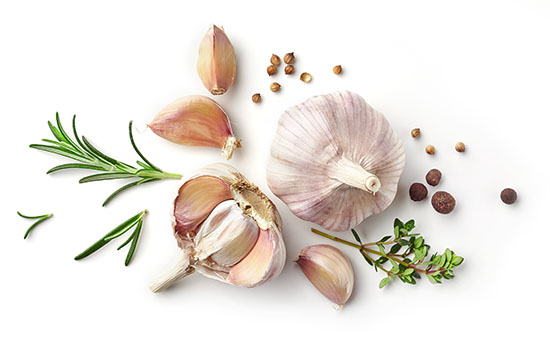
Everyday Chemicals Are Screwing Up Your Testosterone
You may have already read my other article on 7 habits which are killing your testosterone. There was a section in that on Water because

We’re told to eat colorful fruits and vegetables to get the wide range of vitamins and minerals we need for health.
However, the pale and often overlooked garlic bulb provides a power packed punch of nutrients which affect several levels of health.
Check out the incredible health benefits research says adding this savory vegetable to your daily diet can bring.
Garlic is part of the allium family, and has so many health properties that it’s often considered medicinal food.
This is because allium vegetables are rich in organosulfur compounds, which some research suggests are beneficial for lowering both cholesterol and blood pressure.
It may even help prevent cancer and cardiovascular disease.
The best known of these compounds is allicin, which is only present in fresh garlic after it’s been cut or crushed (1).
Other compounds that play a role in garlic’s health benefits include diallyl disulfide and s-allyl cysteine (2).
Garlic also contains phytochemicals, chemical compounds in plants that influence many metabolic processes.
According to the American Institute of Cancer Research studies suggest that the phytochemicals in garlic may improve immune function and can reduce the risk of developing cancer by preventing inflammation and DNA damage.
Other studies also find that garlic and onions have antibacterial and antiviral properties (3).
It doesn’t just taste great in a meal; a one-ounce serving of garlic contains (4):
Significant amounts of calcium, copper, potassium, phosphorus, iron and vitamin B1
Researchers have found that compounds in garlic, like allicin, are very effective at killing the bugs responsible for many infections, including the common cold.
Garlic actually could even help prevent colds and other infections.
In one study, subjects used garlic supplements or a placebo for 12 weeks between November and February. The garlic users were significantly less likely to catch cold, and those that did recovered faster than the placebo group.
The placebo group also had a greater likelihood of catching more than one cold over the 12-week study. Researchers attributed garlic’s cold virus fighting ability to its biologically active component allicin (5).
High blood pressure is one of the biggest drivers of heart disease and stroke.
High doses of garlic have been found to improve blood pressure in those diagnosed with this dangerous condition. Recent research finds that, in some instances, garlic can be as effective as some prescription medications.
Several studies have confirmed garlic’s significant impact on reducing blood pressure in people with hypertension (6, 7, 8). In one recent study, 600 to 1,500 mg of garlic extract was equally effective as the prescription blood pressure drug Atenolol at improving hypertension over a six month period (9).
Garlic has an antiseptic effect on the dental plaque bacteria that can cause cavities if left untreated.
It can also treat mouth infections like periodontitis, oral thrush, and the sore mouth some people get from wearing dentures. Garlic may also be used together with antibiotics treat multi-drug resistant bacteria (10, 11, 12).
Allicin in garlic combats bacteria by inhibiting the enzymes that bacteria need for survival (13).
Raw garlic has been shown to be an effective antibacterial against H. pylori, a common bacterial infection and the main cause of ulcers in both human and animal studies.
This is because the allicin in garlic reacts with proteins that inhibition inflammation pathways associated with inflammation (14, 15). Allicin also increases the concentration of antioxidant enzymes (16).
Alzheimer’s disease is a type of dementia that robs people of their mental abilities and memories. Eventually, they don’t even remember who they are.
The antioxidants in garlic help support your body’s protective mechanisms against free radical damage that can contribute to cognitive decline.
In Alzheimer’s patients, β-amyloid peptide plaques are typically found in the brain and central nervous system. These plaque deposits increase the production of free radicals and cause brain tissue damage.
A recent study in the Journal of Neurochemistry reports that aged garlic extract has significant neuroprotective properties through the biologically active compound S-allyl-L-cysteine (SAC).
The researchers concluded that the aged extract containing SAC has potential to develop future drugs to treat Alzheimer’s disease (17).
Many multivitamins feature “token amounts” of garlic in their formulations so they can say they offer it but Alpha Wolf Nutrition is proud to say we have a full 350 mg serving of garlic in Next Level Superfoods multivitamin!
And that is just 1 of 11 different full serving micronutrient and phytonutrient dense superfoods you’ll get everyday in a single serving.
REFERENCES

You may have already read my other article on 7 habits which are killing your testosterone. There was a section in that on Water because

Rhodiola Rosea stands out as a potent adaptogenic herb with a rich history of traditional use and a growing body of scientific research. Revered for

In this comprehensive article, we will explore what L-tyrosine is, its benefits as a pre-workout supplement, the correct dosage, and other potential health benefits it

Betaine anhydrous is becoming an increasingly popular ingredient for pre-workouts. In this article, we will explore the fundamentals of betaine anhydrous, its connection to carnosine,

Beta-alanine is a pre-workout powerhouse. From boosting workout performance to potential anti-aging effects, discover why this amino acid is a favorite among health buffs.

You may have already read my other article on 7 habits which are killing your testosterone. There was a section in that on Water because

Rhodiola Rosea stands out as a potent adaptogenic herb with a rich history of traditional use and a growing body of scientific research. Revered for

In this comprehensive article, we will explore what L-tyrosine is, its benefits as a pre-workout supplement, the correct dosage, and other potential health benefits it

In the ancient wilderness, a legendary creature prowled the untamed lands—a fierce and noble Alpha Wolf. This majestic beast possessed an aura of strength and resilience, leading its pack with unwavering authority.
In a parallel realm, a group of visionary alchemists delved into the mysteries of nature, seeking to create potent elixirs that could unlock the true potential of those who dared to embrace their inner power.
As fate would have it, these paths crossed, and an extraordinary alliance was forged. The Alpha Wolf and the alchemists found common ground in their pursuit of greatness, and thus, Alpha Wolf Nutrition was born.
United by a shared passion for excellence, the Alpha Wolf and the alchemists dedicated themselves to crafting supplements that harnessed the raw force of nature, empowering individuals to conquer their inner and outer worlds.
At Alpha Wolf Nutrition, we draw inspiration from the primal instincts of the Alpha Wolf—the embodiment of strength, leadership, and vitality. We believe that every individual possesses a dormant power within, waiting to be awakened.
Through our meticulously crafted products, we strive to unleash this dormant potential, allowing you to thrive in the face of challenges and embrace your true nature.
Our commitment lies in providing you with the highest quality, scientifically proven ingredients, carefully curated to deliver optimal results. We leave no room for guesswork, basing our formulations on human-backed research to ensure real, tangible benefits. With us, you’ll find no “proprietary blends” or token additions—just pure, effective dosages that fuel your journey to greatness.
Join the pack of Alpha Wolves and embark on a transformative journey with Alpha Wolf Nutrition. Embrace your inner strength, rise above the ordinary, and conquer your aspirations. Unleash the power within and let the spirit of the Alpha Wolf guide you to achieve your highest potential. Welcome to Alpha Wolf Nutrition, where the path to greatness awaits.

Alpha Wolf Nutrition is based on real science and results for the people we serve.
We do not cut corners, we do not hide behind “proprietary blends” and we do not put in worthless amounts of token ingredients to fill up a label.
What we do, is kick ass!

© 2016 – 2023 Alpha Wolf
Discount Applied Successfully!
Your savings have been added to the cart.